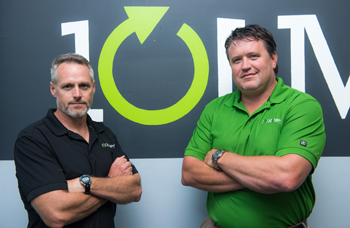A Wilmington-based company that helps people adapt to their environment has shown that it, too, can be adaptable. Since its official founding in 2008, 101 Mobility has remained true to its business focus but has rethought almost everything else about its approach.
The company was launched at the depth of the recession by two out-of-work mortgage brokers, Keith Barnhardt and Luke Sampson, who saw opportunity in a completely different industry: providing equipment that would give disabled individuals greater mobility and would allow older adults to remain in their homes.
“We all came from the mortgage industry and found ourselves unemployed when the market imploded in 2007,” said Barnhardt, now 101 Mobility’s senior vice president of products and corporate development. “We worked well together and were looking for the next opportunity.”
He stumbled across just such an opportunity through a family friend in Salisbury who owned a durable medical equipment (DME) company and ran a side business selling auto lifts and ramps, mostly for the Veterans Affairs medical facility in Salisbury.
“I saw that business was not as regulated by government payers as [some others] were and felt that a mobility and accessibility business would be scalable,” Barnhardt said.
He and Sampson developed their concept that year and launched in 2008, with one sales rep in Raleigh and another in Cleveland, Ohio, where the pair had business contacts. In the second half of the year, they brought on another partner: Dave Pazgan, who had been the president of their former mortgage company. Pazgan became 101 Mobility’s president and CEO.
“Right away they were oriented toward the mobility side [rather than medical supplies],” Pazgan said of the original partners. “It was an area where they felt they were getting good traction. The competition was mostly from small independents and it was disorganized.”
The fledgling company logged sales of $850,000 at the end of its first year. By 2012, sales had reached $7 million, swelling to just under $20 million in 2013.
Joel Brenner, 101 Mobility’s director of franchise operations and marketing, said the company expects that pace of growth to continue.
Not bad for a six-year-old company, especially one whose founders discovered obstacles to growth in their original business plan and had to design a more accessible path to success.
“In our first year with Dave, we rebranded, launched our website and added sales reps,” Barnhardt said. “By the end of 2009, we were a $3 million company. The challenge, however, was we could produce sales but occasionally we struggled with installation. We didn’t have the right people in remote locations.”
The three partners believed that, rather than trying to grow by adding corporate locations, the company might be better off growing largely through franchising. They retooled, developing clear processes and procedures, a new operations manual and operating system, ensuring that their model could be replicated. Sampson assumed the role of senior vice president of franchise training and support.
In April 2010, 101 Mobility got the go-ahead to offer franchises. It sold its first in October of that year, and by year’s end had three operating franchises and one in progress. Currently, the company has sold 36 franchises, 33 of which are operating, in 80 territories. Each territory has a population of 750,000 to 1 million. Most franchisees own more than one territory, Brenner said.
The market for 101 Mobility’s products – accessibility equipment to allow people to function fully in their homes and mobility equipment to allow people with disabilities to get out and about – is significant and growing all the time, Brenner said.
“We’re already in the disability market. The growth opportunity is the aging-in-place market,” he said. “There are 80 million baby boomers, and the oldest of them turned 65 in 2011. Right now, they are buying our products for their parents. They will start being aging customers in about 10 years. They want to stay in their homes.”
The key to success in franchising, of course, was for 101 Mobility to be careful in selecting its franchisees and then provide plenty of training and follow-up. The company’s ability to nurture its franchises got a boost in May of last year, when the company was acquired by private equity firm Cortec.
“That gave us capital to invest in infrastructure,” Barnhardt said. “We were falling behind in meeting our goals. Now we have collateral materials for field support, which
has helped us improve our service to franchisees, support them through their early months.”
Pazgan said that 101 Mobility’s overarching goal is to “bring the service level and consistency of brand promise to customers all across the country. We believe there’s a kind of unique opportunity to be a brand leader in the mobility and accessibility world.”
To get there, 101 Mobility maintains a limited focus. Within that area of focus, which consists primarily of selling niche products through a growing franchise network, 101 Mobility has expanded into a few corporate-owned stores and even manufactures a modular wheelchair ramp, giving the company direct access to a high-demand product.
“We’re opportunistic, yet careful not to run in too many directions at the same time,” Pazgan said.
At its core, 101 Mobility reflects the solid relationships among its three owners. Having worked together before, the three trust each other and know their strengths and weaknesses, Pazgan said.
“That gives us the opportunity to leverage off each other and increase our capacity to grow the company,” he said. “Now we all share responsibilities for the corporate and franchise aspects of the business. If it was even a two-man show, a lot of that would have been difficult.”


